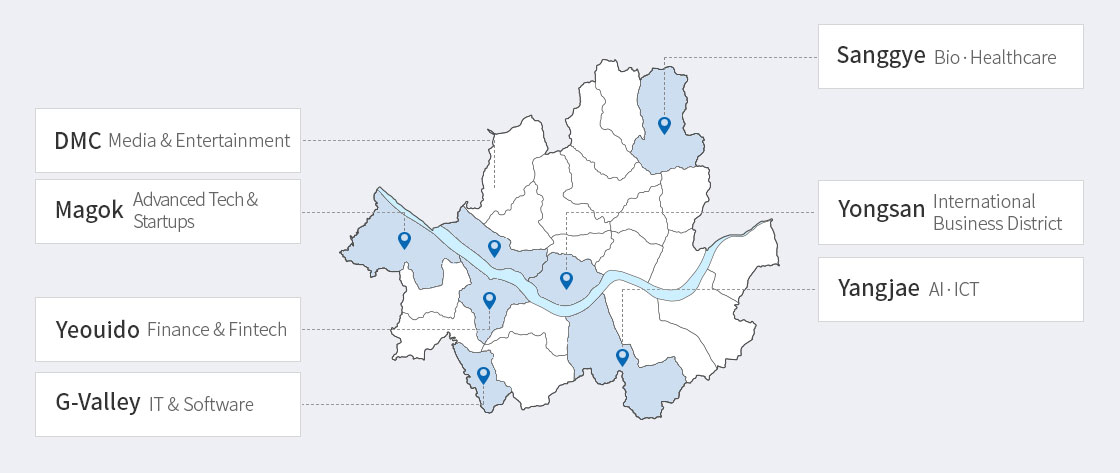- home
- Why Seoul
- Industrial Clusters


- 디지털 Y-밸리 IT 융합, 드론
- 금융 여의도-마포 핀테크, 블록체인
- 연구개발(R&D) 마곡 대기업과 스타트업
- 사물인터넷 (IoT) G-밸리 IT 융합, 하드웨어 및 소프트웨어
- 바이오 홍릉 바이오 메디컬
- 로봇 수서 로봇, 인공지능, ICT
- 인공지능(AI) 양재 인공지능, ICT, R&D
YONGSAN International Business District
Located in the heart of Seoul, Yongsan is being developed into a major hub for finance and the MICE industry through the creation of an international business district. The area is evolving into a multifunctional urban space where business, residential, and cultural elements coexist along the Han River. In 2025, Yongsan’s development project was selected as one of the world’s top five at MIPIM, the world’s largest real estate exhibition in France.
Sanggye Bio · Healthcare
Seoul’s Digital Bio City, is emerging as a key growth base for the bio and healthcare industries. With an innovation ecosystem that links Seoul Medical Center, SeoulTech, and local bio startups, the district is focusing on advancing precision medicine and smart healthcare.
Yangjae AI·ICT
Yangjae is home to Seoul’s AI innovation cluster, including the Seoul AI Hub. The area supports R&D, talent development, and AI-industry convergence.
Yeouido Finance·Fintech
Often referred to as the “Wall Street of Korea,” is home to the Korea Exchange, Financial Supervisory Service, and other major financial institutions. The area actively nurtures Fintech companies and talent through initiatives like the Seoul Fintech Lab, the Seoul Financial Hub, and a graduate school specializing in digital finance.
Magok Advanced Tech·Startups
Magok is an eco-friendly innovation cluster combining R&D, corporate labs, and residential areas. It hosts major firms like LG Sciencepark and the M+ startup hub.
G-Valley IT ·Software
Once a textile center, G-Valley has transformed into a tech-driven smart industrial complex, now a hub for IT, software, and hardware startups—Seoul’s answer to Silicon Valley.
DMC Media·Entertainment
Digital Media City (DMC) in Sangam is a key hub for broadcasting, film, gaming, and digital content industries, with 500+ companies and leading media giants like MBC and JTBC.